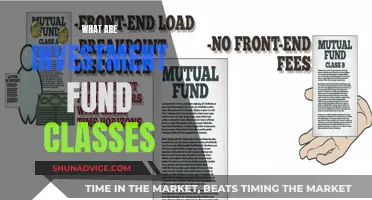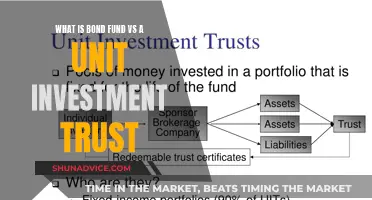
Investing in managed funds can be a great way to grow your money and reach your financial goals. A managed fund is a type of investment where your money is pooled with other investors, and a fund manager buys and sells assets such as cash, shares, bonds, and property on your behalf. The appeal of managed funds lies in the fact that you can leave the buying and selling decisions to the fund manager, who aims to generate positive returns. While this provides access to a diverse range of investments, there are also some dangers associated with investing in managed funds, including underperformance and higher fees. So, should you invest in managed funds? Let's explore the benefits and risks to help you decide.
| Characteristics | Values |
|---|---|
| Definition | A type of investment where your money is pooled together with other investors. |
| Investment types | Single asset, fixed interest or bond funds, property loans, share (equity) funds, alternative investment funds, mixed asset or multi-sector funds |
| Investment process | A fund manager buys and sells assets such as cash, shares, bonds and listed property trusts on your behalf. |
| Ownership | You don't own the underlying investments, you own 'units' in the fund or 'shares' in a Corporate Collective Investment Vehicle (CCIV). |
| Risk | The value of the units or shares will rise and fall with the value of the underlying assets. |
| Income | Some managed funds also pay income or 'distributions'. |
| Cost | The entry cost tends to be lower than buying shares directly. |
| Fees | Establishment fee, contribution fee, management fees and costs, performance fee, adviser service fee, transaction fees, withdrawal fees, etc. |
| Performance | Actively managed funds do not always outperform the benchmarks. |
| Advantages | Access to a broad range of investments, experienced fund managers, opportunity to make regular contributions, benefits of compounding effect, lower risk due to diversification. |
| Disadvantage | Most Australian managed funds do not outperform the ASX 200 index over a long period of time. |
What You'll Learn

What are managed funds?
Managed funds are a type of investment where your money is pooled with other investors. A fund manager then uses this pool of money to buy and sell assets such as cash, shares, bonds, and property on your behalf. The fund manager's job is to use your money to generate positive returns. Managed funds are also known as managed investment schemes or Corporate Collective Investment Vehicles (CCIVs).
When you invest in a managed fund, you purchase 'units' in the fund or 'shares' in the CCIV. The number of units or shares you get depends on the unit or share price at the time of investment. The value of these units or shares will rise and fall with the value of the underlying assets.
There are two types of managed funds: actively managed funds and passively managed funds. In actively managed funds, the fund manager actively selects the stocks based on their own convictions. Actively managed funds aim to beat a benchmark index. In contrast, passively managed funds tend to be lower cost and only aim to match the performance of a benchmark. Exchange-traded funds (ETFs) are usually passively managed.
Managed funds offer several benefits, such as diversification, access to a broad range of investments, and the expertise of experienced investment managers. However, it's important to note that managed funds come with fees, and the performance of these funds can vary. Most Australian managed funds, for example, have not outperformed the ASX 200 index over the long term.
Schwab Fund Investment: A Beginner's Guide to Getting Started
You may want to see also

Benefits of investing in managed funds
Investing in managed funds has several benefits. Firstly, it provides access to a wide range of investment opportunities that individual investors might not otherwise be able to access, such as international markets. Managed funds also offer diversification benefits, allowing investors to spread their risk across a variety of assets and sectors. This diversification can help to moderate volatility and smooth out investment returns over time.
Another advantage of managed funds is that they are professionally managed by experienced and qualified fund managers who have extensive contacts and access to detailed information. These fund managers are constantly researching and monitoring investment markets to make informed, timely decisions on behalf of investors. This can be particularly advantageous for investors who want to invest in markets or sectors in which they have little or no experience.
Additionally, managed funds are convenient and efficient. They handle paperwork and administration, provide regular information on the fund's performance, and offer annual tax statements and tax guides. The wide variety of managed funds available also ensures that the personal requirements of each individual investor can be met, whether they are seeking high-risk/high-growth investments or low-risk investments that provide consistent income.
Furthermore, investing in managed funds allows investors to benefit from dollar cost averaging and compound growth. Dollar cost averaging helps to reduce the overall investment cost by purchasing investment units at different prices over time. Reinvesting fund distributions into additional units provides a compound interest multiplier effect, enhancing the growth of the investment capital.
Tudor Funds: A Guide to Investing in Their Success
You may want to see also

Risks of investing in managed funds
Investing in managed funds can be a great way to grow your money and reach your financial goals. However, as with any form of investing, there are risks involved. Here are some key risks to consider when investing in managed funds:
Market Risk
Market risk is the possibility that your investment may fall in value due to general market events or economic downturns. For example, financial crises, natural disasters, inflation, recession, or political instability can all negatively impact the value of your investments.
Company-Specific Risk
This is the risk associated with investing in a particular company. For instance, if a company's new product launch fails or if the company faces an accident or scandal that damages its reputation and finances, your investment in that company may lose value.
Credit Risk
Credit risk is common in bond investments. It refers to the possibility that the entity you've lent money to, such as a company or government, may default on their loan obligations and be unable to repay the agreed-upon interest or principal amount.
Interest-Rate Risk
Interest-rate risk primarily affects bond funds. When interest rates rise, the value of your bonds will typically fall because the interest rate on bonds is fixed. As a result, your bonds become less attractive compared to new investments offering higher interest rates.
Currency Risk
Currency risk relates to fluctuations in currency values. If you invest in one currency and then convert your returns back to your local currency, you may end up with less money due to unfavourable exchange rates.
Liquidity Risk
Liquidity risk refers to the ease and speed with which you can sell your investment for cash. Some investments in managed funds may be illiquid, meaning they cannot be easily sold or may require a significant reduction in price to achieve a quick sale.
Fees and Costs
Managed funds typically charge various fees, such as establishment fees, contribution fees, management fees, performance fees, and adviser service fees. These fees can eat into your overall returns and should be carefully considered before investing.
It's important to remember that investing in managed funds, like any other investment, carries risks. Understanding these risks and managing them effectively is crucial for making informed investment decisions.
TCI Fund Investment: A Guide to Getting Started
You may want to see also

Types of managed funds
Managed funds are a type of investment where your money is pooled with other investors and a fund manager buys and sells assets on your behalf. There are thousands of managed funds to choose from, and they can be categorised in several ways.
Firstly, managed funds can be either actively or passively managed. Actively managed funds are where the manager selects the stocks based on their own convictions, whereas passively managed funds tend to be lower cost and aim to match the performance of a benchmark rather than beat it. Exchange-traded funds (ETFs) are usually passively managed.
Secondly, managed funds can be open-end or closed-end. Open-end funds continuously offer and redeem shares based on each day's closing net asset value (NAV). Closed-end funds, on the other hand, raise money through an IPO and then begin trading on an exchange.
Thirdly, managed funds can be single-asset or multi-asset. Single-asset funds invest in a single class of assets, such as shares, property, or bonds. Multi-asset or multi-sector funds invest in a range of assets, typically including shares, property, cash, and fixed interest.
Finally, managed funds can be mutual funds, hedge funds, or index funds. Mutual funds are the oldest type of investment fund and are vehicles that pool money from investors to buy securities. Hedge funds pool money from wealthy investors and aim to make money regardless of the overall market movements. Index funds try to contain all the securities in a particular index and generate steady returns with lower risk.
Energy Mutual Funds: Invest Now or Wait?
You may want to see also

Fees associated with managed funds
Managed funds charge a range of fees for managing your money. Small differences in fees can have a large impact on your returns. The more fees you pay, the higher your investment returns must be to make up for them. Every extra 1% you pay in fees each year will cost you 10% of your potential investment over a 10-year period.
- Establishment fee — This is the fee to open your investment account. It is usually between 0% and 5% of the amount you invest.
- Contribution fee — This is the fee charged on each amount contributed to your investment. It is typically between 0% and 5%.
- Management fees and costs — These are the fees and costs for managing your investment. It is usually between 0.5% and 2.5% per year and is deducted from your account balance.
- Performance fee — This is an additional fee a fund manager may charge if the investment return is better than the benchmark or target return.
- Adviser service fee — This is an ongoing fee paid to your financial adviser for arranging the investment. It is typically between 1% and 2% per year.
- Buy/sell spreads — These are transaction fees the investment manager may charge when you buy more units in the managed fund or redeem units.
The scheme may also charge fees for transactions, withdrawals, changing investment options, or exiting the scheme. It is important to note that fees reduce the returns of a managed fund and can increase the size of losses as they are charged regardless of whether the fund makes a profit or a loss.
SBI Blue Chip Fund: A Smart Investment Strategy
You may want to see also
Frequently asked questions
A managed fund is a type of investment where your money is pooled with other investors. A fund manager then buys and sells assets such as cash, shares, bonds and listed property trusts on your behalf.
Investing in a managed fund can give you access to a broad range of investments that you may not have been able to invest in as an individual. It can also be beneficial to have a professional fund manager look after your money if you don't have the time, knowledge or skills to make informed investment decisions.
Most Australian managed funds do not outperform the ASX 200 index over a long period of time. In addition, there are fees involved when investing in a managed fund, and these can have a significant impact on your overall returns.







